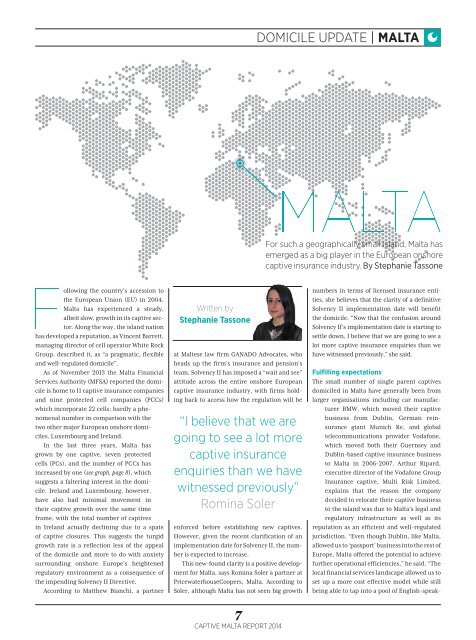1EfXer3
1EfXer3
1EfXer3
You also want an ePaper? Increase the reach of your titles
YUMPU automatically turns print PDFs into web optimized ePapers that Google loves.
DOMICILE UPDATE | MALTA<br />
For such a geographically small island, Malta has<br />
emerged as a big player in the European onshore<br />
captive insurance industry. By Stephanie Tassone<br />
ollowing the country’s accession to<br />
the European Union (EU) in 2004,<br />
Malta has experienced a steady,<br />
albeit slow, growth in its captive sector.<br />
Along the way, the island nation<br />
has developed a reputation, as Vincent Barrett,<br />
managing director of cell operator White Rock<br />
Group, described it, as “a pragmatic, flexible<br />
and well-regulated domicile”.<br />
As of November 2013 the Malta Financial<br />
Services Authority (MFSA) reported the domicile<br />
is home to 11 captive insurance companies<br />
and nine protected cell companies (PCCs)<br />
which incorporate 22 cells; hardly a phenomenal<br />
number in comparison with the<br />
two other major European onshore domiciles,<br />
Luxembourg and Ireland.<br />
In the last three years, Malta has<br />
grown by one captive, seven protected<br />
cells (PCs), and the number of PCCs has<br />
increased by one (see graph, page 8), which<br />
suggests a faltering interest in the domicile.<br />
Ireland and Luxembourg, however,<br />
have also had minimal movement in<br />
their captive growth over the same time<br />
frame, with the total number of captives<br />
in Ireland actually declining due to a spate<br />
of captive closures. This suggests the turgid<br />
growth rate is a reflection less of the appeal<br />
of the domicile and more to do with anxiety<br />
surrounding onshore Europe’s heightened<br />
regulatory environment as a consequence of<br />
the impending Solvency II Directive.<br />
According to Matthew Bianchi, a partner<br />
Written by<br />
Stephanie Tassone<br />
at Maltese law firm GANADO Advocates, who<br />
heads up the firm’s insurance and pension’s<br />
team, Solvency II has imposed a “wait and see”<br />
attitude across the entire onshore European<br />
captive insurance industry, with firms holding<br />
back to access how the regulation will be<br />
“I believe that we are<br />
going to see a lot more<br />
captive insurance<br />
enquiries than we have<br />
witnessed previously”<br />
Romina Soler<br />
enforced before establishing new captives.<br />
However, given the recent clarification of an<br />
implementation date for Solvency II, the number<br />
is expected to increase.<br />
This new-found clarity is a positive development<br />
for Malta, says Romina Soler a partner at<br />
PricewaterhouseCoopers, Malta. According to<br />
Soler, although Malta has not seen big growth<br />
7<br />
CAPTIVE MALTA REPORT 2014<br />
numbers in terms of licensed insurance entities,<br />
she believes that the clarity of a definitive<br />
Solvency II implementation date will benefit<br />
the domicile. “Now that the confusion around<br />
Solvency II’s implementation date is starting to<br />
settle down, I believe that we are going to see a<br />
lot more captive insurance enquiries than we<br />
have witnessed previously,” she said.<br />
Fulfilling expectations<br />
The small number of single parent captives<br />
domiciled in Malta have generally been from<br />
larger organisations including car manufacturer<br />
BMW, which moved their captive<br />
business from Dublin, German reinsurance<br />
giant Munich Re, and global<br />
telecommunications provider Vodafone,<br />
which moved both their Guernsey and<br />
Dublin-based captive insurance business<br />
to Malta in 2006-2007. Arthur Ripard,<br />
executive director of the Vodafone Group<br />
Insurance captive, Multi Risk Limited,<br />
explains that the reason the company<br />
decided to relocate their captive business<br />
to the island was due to Malta’s legal and<br />
regulatory infrastructure as well as its<br />
reputation as an efficient and well-regulated<br />
jurisdiction. “Even though Dublin, like Malta,<br />
allowed us to ‘passport’ business into the rest of<br />
Europe, Malta offered the potential to achieve<br />
further operational efficiencies,” he said. “The<br />
local financial services landscape allowed us to<br />
set up a more cost effective model while still<br />
being able to tap into a pool of English-speak-


